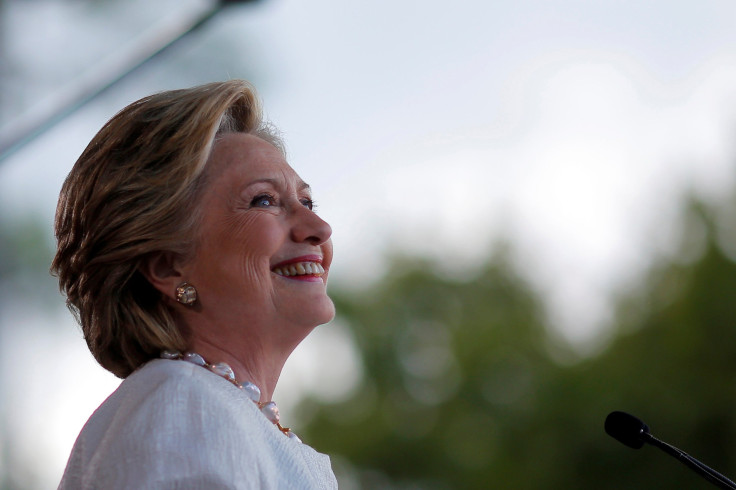Donald Trump, Hillary Clinton Latest Polls: The Surprise Red State Hillary Can Win On Election Day; Gary Johnson The Spoiler?

In an election year with voter dissatisfaction at all-time high levels, the national map could take on a more purple hue as Democratic nominee Hillary Clinton makes inroads in traditionally right-leaning states.
While everyone is aware of the so-called swing or battleground states (Maine, New Hampshire, Ohio, North Carolina, Georgia, Florida, Wisconsin, Iowa, Utah, Arizona and Nevada), the question is whether Republican nominee Donald Trump can hold on to the bastions of GOPism to avoid an electoral-college landslide next Tuesday.
Polls indicate reliably Republican Alaska, with its three electoral votes, is leaning toward Clinton. Craciun Research queried 400 voters who indicated last week they favored Clinton 47 percent to 43 percent, with 18 percent of voters saying they still were undecided.
“If you look at nonpartisan voters, Secretary Clinton is winning by a margin of 15 points. That may give you a sense of how the undecided voters will lean on Election Day,” pollster Jean Craciun said.
Trump’s support was down by 4 points since mid-October.
An earlier poll released by the campaign of Sen. Lisa Murkowski, R-Alaska, indicated Trump was up only 3 points on Clinton (the poll had a 4-point margin of error), but that poll was taken prior to allegations Trump sexually assaulted women. It also was before FBI Director James Comey announced the reopening of an investigation into Clinton’s email server.
The Murkowski poll gave Libertarian Gary Johnson 10 percent of the vote, putting him in position to play the spoiler, despite lapses like failing to know about the besieged Syrian city of Aleppo and stumbling when asked to name a foreign leader he admired.
Yet Johnson, a former governor of New Mexico, remains a key figure in Alaska and other states. As a Libertarian, his fiscal policies are close to the Republican approach while his social policies mirror the Democrats. Questions linger over which side he will siphon more support from.
Unlike Green Party nominee Jill Stein, Johnson is the only third-party candidate on the ballot in all 50 states.
The polling, indicating Republican support isn’t as rock solid behind Trump as it was for former Massachusetts Gov. Mitt Romney in 2012 and Arizona Sen. John McCain in 2008, has encouraged the Clinton campaign to begin pouring money into states that normally lean red. Campaign manager Robby Mook has said $2 million would be diverted to Arizona, which went red in 11 of the past 12 elections, to expand television and other advertising.
It's unclear if Trump can regain support in Arizona after some notable setbacks. During the primary season, Trump disparaged McCain, a decorated military veteran and Arizona senator since 1986, for getting captured by the North Vietnamese. Trump said he liked “people who weren’t captured.” McCain would later unendorse Trump after the release of the “Access Hollywood” tape in which the presidential candidate was heard bragging in vulgar terms about forcing himself on women.
Johnson could play a role in Arizona as well. Libertarians drew enough votes in the 2012 election to allow Democrats Kyrsten Sinema and Ann Kirkpatrick to win their House races. Jeff Flake, a Libertarian in many respects, won his Senate seat that year.
“Donald Trump has managed to make this an interesting state in terms of presidential politics, and not in the way that Republicans have wanted,” Flake told NPR.
President Barack Obama lost Arizona by roughly 9 points in 2008 and 2012. Polls this year indicate the state is much closer. The CBS/YouGov poll released this week has Trump only 2 points ahead while the Monmouth University poll cuts that margin in half.
“We do see opportunity in Arizona," Mook told U.S. News and World Report and World Report. "We think that it's an uphill climb, but our mission as a presidential campaign is to make sure that Secretary Clinton wins at least 270 electoral votes."
The Clinton campaign last month sent Michelle Obama to Phoenix. The first lady, who is seen as someone to whom other people listen, also joined former first daughter Chelsea Clinton and former Clinton rival Sen. Bernie Sanders in Vermont.
Meanwhile, Clinton appears to have an edge in North Carolina. It was solidly Republican in 2012 (2008 was the only time since 1972 it voted Democratic for president). Both of its U.S. senators and the governor are Republican although three Democrats slipped into its 13-member House delegation. The North Carolina Legislature is controlled by the GOP. But the RealClear Politics average of polls gives Clinton a 2-point edge in the state.
© Copyright IBTimes 2025. All rights reserved.






















